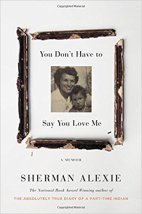
You Don’t Have to Say You Love Me by Sherman Alexie
Published by Little, Brown & Co, 2017
Rating: 4.5/5.0
Genre: Memoir
I always experience Sherman Alexie books twice. Once in written form, where I can absorb every nuance and passage. And once in audible form, where I can close my eyes and be lulled by his poetic, singsongy voice. WARNING: Don’t listen to his books while driving, because I guarantee you, you’ll become so mesmerized by his voice that you’ll breeze right by your exit and end up miles from your intended destination.
When I heard that he was writing a memoir focused on his complicated relationship with his Mother, I nearly wept with delight. His previous truth-based fictional stories have alluded to a troubled past. You Don’t Have to Say You Love Me didn’t disappoint. It is raw and piercing. It is loving and compassionate. It is sometimes crass. It is sometimes humorous. It is always brutally honest. Alternating between poetry and prose, it is strikingly elegant, ever word expertly chosen by Alexie. Oftentimes words are repeated, over and over again, as if carrying a drum beat alongside it. This is deliberate and powerful.
“Great pain is repetitive. Grief is repetitive. And, maybe, this repetition can become a chant inside a healing ceremony.”
Inspired by Lillian’s death in 2015, the book reveals a conflicted woman — fiercely strong and protective. Stoic to the point of condoning racism and abuse toward her children. Yet she painstakingly quilts in the dark to earn money to pay the electricity bill. While Lillian quit drinking to better care for her children, she simultaneously neglects them emotionally and abuses them both verbally and physically. Alexie recounts stories from his childhood, growing up in poverty on a Spokane Indian Reservation, that will bring tears to your eyes. And yet he does so in a way that will also make you laugh out loud.
It is clear that Alexie is still haunted by his mother, and struggles with his grief. “I don’t believe in ghosts”, he writes, “but I see them all the time.” He takes us on a spiritual and emotional journey to authenticate his conflicted feelings for his mother. He patches their history together, like the quilts she lovingly made, the stories that created their troubled relationship — born of bitterness for her violence and an empathy for her own troubled past. And in doing so, Alexie acknowledges the cyclical nature of life and recognizes that Lillian’s pain is his pain.
“In the indigenous world, we assign sacred value to circles. But sometimes a circle just means you keep returning to the same sh*% again and again. This book is a series of circles, sacred and profane.”
And in writing this memoir he finally gives Lillian a voice to respond to the grievances he lays upon her. For as he himself points out, “And the tombstone will never answer. Because the dead have only the voices we give to them.”
I think Lillian would be proud of the voice you have given her, Alexie — bold, genuine, humorous and vulnerable.
Share this:




